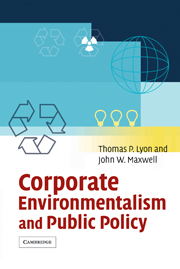Book contents
- Frontmatter
- Contents
- Preface
- Part I The interaction of strategy and policy
- Part II Corporate strategy and the policy life cycle
- Part III Government voluntary programs
- 6 An institutional analysis of voluntary environmental agreements
- 7 Negotiated agreements
- 8 Self-regulation, taxation, and public voluntary agreements
- 9 The design of public voluntary agreements
- 10 Conclusions
- References
- Index
7 - Negotiated agreements
Published online by Cambridge University Press: 10 December 2009
- Frontmatter
- Contents
- Preface
- Part I The interaction of strategy and policy
- Part II Corporate strategy and the policy life cycle
- Part III Government voluntary programs
- 6 An institutional analysis of voluntary environmental agreements
- 7 Negotiated agreements
- 8 Self-regulation, taxation, and public voluntary agreements
- 9 The design of public voluntary agreements
- 10 Conclusions
- References
- Index
Summary
INTRODUCTION
As we explained in chapter 6, both firms and regulators may have incentives to negotiate around the process of creating new legislation and regulation. Our model of self-regulation in chapter 3 focused on the incentives of firms to preempt the regulatory process, leaving the regulator as a passive “black box” whose objectives were not specified. Here we develop a model in which the regulator's objectives are clearly stated, and negotiated agreements (NAs) emerge out of bargaining between the regulator and an industry association. This model, with a more pro-active regulator, reflects situations where the regulator has significant bargaining power. In fact, the analysis of chapter 3 can be thought of as a special case of a negotiated agreement in which industry holds all the bargaining power.
Negotiated agreements are more common in the nations of Europe and Japan than in the USA, perhaps because of the corporatist structure of many of these countries, which allows industry to negotiate as a unit with government. In addition, the parliamentary structure of the democracies of these nations ensures that the legislative and executive branches of government are of the same political party, potentially making legislative threats more credible.
This chapter presents a model of NAs that parallels in a number of ways the analysis of self-regulation introduced in chapter 3. In both cases, regulation is a function of interest group pressure, and the level of environmental protection is below the welfare maximizing level. At the same time, there are several differences in the two models. In particular, this chapter allows for uncertainty regarding the imposition of legislation, and incorporates a pro-active regulator who can bargain for a portion of the surplus created by regulatory preemption.
- Type
- Chapter
- Information
- Corporate Environmentalism and Public Policy , pp. 176 - 194Publisher: Cambridge University PressPrint publication year: 2004



